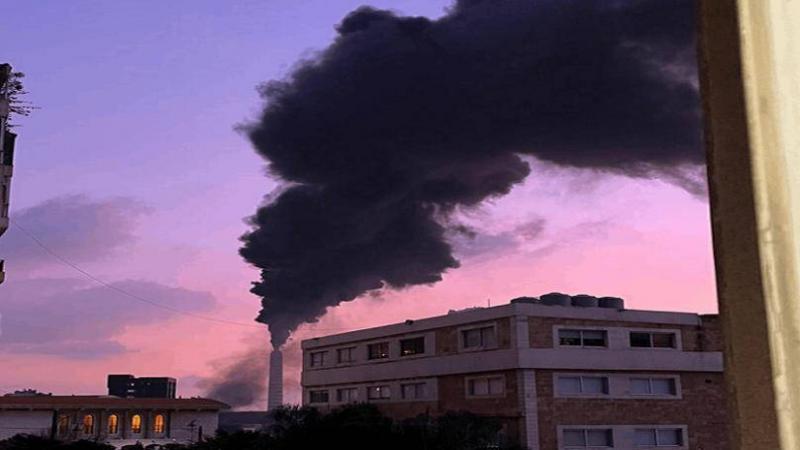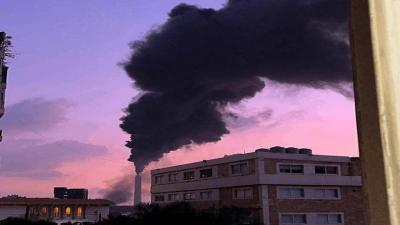Electricité du Liban issued the following statement: As some media outlets and social media platforms circulated news about black smoke rising from the Zouk thermal plant chimney on Tuesday, September 6, 2022, Electricité du Liban wants to clarify several matters regarding this issue:
The lack of supply of a shipment of gas oil designated for Electricité du Liban through the Ministry of Energy and Water - the General Directorate of Oil, under the Iraqi exchange agreement for August 2022 (with no expected shipment for September 2022), and in light of the complete depletion of the company's reserves of gas oil and fuel oil (Grade A), led the company's Board of Directors to make an exceptional decision number 301-20/2022 dated August 11, 2022. This decision mandated the use of a quantity of fuel oil (Grade B) from the Zouk and Jiyeh facilities instead of fuel oil (Grade A) in the Zouk and Jiyeh thermal plants, after obtaining approval from both the Prime Minister and the Minister of Energy and Water to avoid a total blackout in the country, as well as the economic, social, and health repercussions on Lebanon.
After receiving approval from both the Prime Minister and the Minister of Energy and Water pursuant to letter number 6066/و dated August 25, 2022, the company began on August 26, 2022, to utilize part of the available stock of fuel oil (Grade B) to restart the Zouk and Jiyeh thermal plants to continue providing at least minimal electricity supply to essential vital facilities in Lebanon (airport, port, water pumps, sewage system, Roumieh Prison, and basic state facilities). No black smoke emissions occurred since the operation of the unit in the Zouk thermal plant until September 6, 2022.
From a technical perspective, the quality of fuel oil (Grade B) is better than fuel oil (Grade A), and all quantities available of this material comply with the contractual specifications prepared by both the operator of the reverse current plants in Zouk and Jiyeh, a consortium of companies "MEP/OEG/ARKAY ENERGY," and the global consulting company Electricité de France "EDF," and Electricité du Liban, according to the signed meeting minutes dated July 8, 2020. Additionally, all samples were subjected to tests and analyses in the laboratories of Bureau Veritas, Dubai, UAE, with all results matching the specifications set by the operator of the reverse current plants and Electricité de France, confirmed by Bureau Veritas reports number IDL-6943-2021 dated November 27, 2021, and number IDL-7664-2021 dated December 26, 2021. The monitoring companies appointed earlier by the General Directorate of Oil verified this before granting permission for unloading from the relevant ships.
The operator of the reverse current plants in Zouk and Jiyeh stopped producing electricity due to administrative reasons and the need for hard currency (Fresh Dollars), and not receiving enough to continue operations led him to put both plants under preservation mode, preventing full utilization of those quantities.
On September 6, 2022, approximately eleven days after the restart of the Zouk thermal power plant, black smoke was observed rising from its chimney during the plant's reconnection due to total network disruption. This dissipated on the same day shortly after restarting, noting that the plant had been forcibly out of service for about eight months due to the complete depletion of its stock of fuel oil (Grade A). Consequently, the head of the Zouk thermal power plant was summoned by the environmental prosecutor in Mount Lebanon for a statement regarding the incident, where he explained both technical aspects of the situation, particularly regarding the potential for black smoke emissions under specific circumstances. In this context, the head of the Zouk thermal power plant committed to shutting down the unit promptly in such cases.
The cause of the smoke emissions is purely technical due to repeated interruptions caused by unstable network conditions. Electricité du Liban previously reported several times, particularly to the Cabinet, that the minimum required to ensure stability on the electrical grid and safeguard production groups in light of increased energy demand exceeding 3,000 megawatts is 1,000 megawatts. Speaking to technical reasons, an emergency fault occurred in the low-pressure pipe to the condenser, leading to a drop in steam pressure in the boiler during load increase upon opening the medium-pressure turbine valves. This caused a drop in the auxiliary steam pressure providing the condenser vacuum; to prevent unit disconnection from the grid, the operators had to activate an additional fuel pump to increase pressure, resulting in a faulty fuel-air mixture and consequently black smoke emissions. This lasted for a brief period until the operating team restored control systems to address the issue, as the team was committed to resuming production as quickly as possible under severe economic and living conditions to supply the mentioned vital ports with electrical power.
Currently, thermal production is only from the Jiyeh thermal plant, as the Zouk thermal plant has ceased generating power, not exceeding 30 megawatts due to ongoing exceptional conditions in the country. Based on the above, Electricité du Liban will refrain from resuming the operation of the production unit until receiving written approval from the Cabinet and the Minister of Energy and Water, as requested by the environmental prosecutor in Mount Lebanon, to proceed with its restart if possible.
Finally, Electricité du Liban expresses its appreciation to its users and workers who are making extraordinary efforts amidst the difficult economic, financial, and monetary conditions the country is experiencing, and amid the severe shortage of human resources within the company in general and the Zouk plant in particular, serving the public interest and ensuring network stability under very challenging operational conditions, providing at least minimal electricity supply to vital essential facilities in Lebanon (airport, port, water pumps, sewage system, Roumieh Prison, and basic state facilities) to ensure minimal operational continuity for the Lebanese administration.




